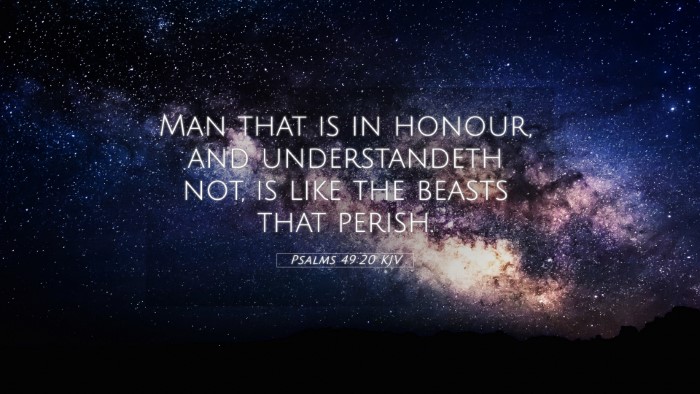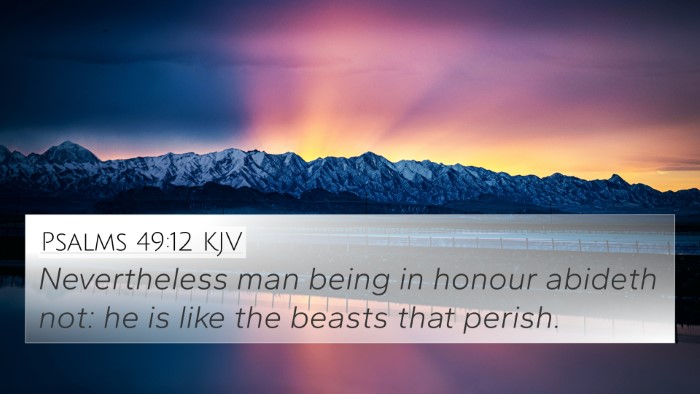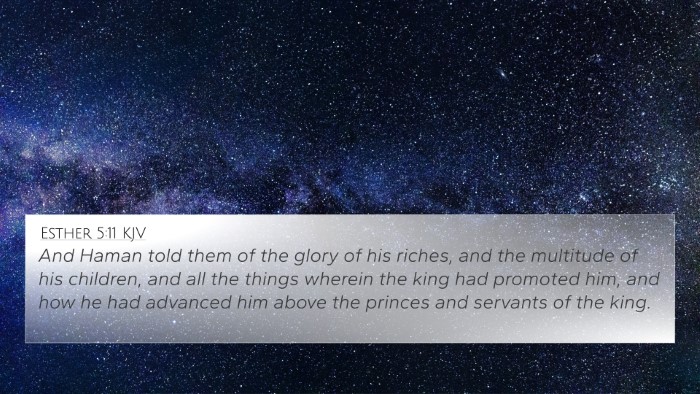Psalms 49:20 - Meaning and Interpretation
Verse: "Man that is in honor, and understandeth not, is like the beasts that perish." (Psalms 49:20, KJV)
The Psalmist reflects on the fleeting nature of human honor and the peril of living without spiritual understanding. In this verse, he juxtaposes mankind's transient status and wisdom against the destiny of mere animals, emphasizing the folly of valuing earthly status without grasping deeper truths.
Summary of Commentary Insights
This verse draws from significant interpretations presented by renowned biblical commentators:
- Matthew Henry: He emphasizes the futility of honor without understanding. A person may be esteemed in society's eyes, yet if they lack comprehension of divine truths, they are ultimately as doomed as unthinking animals.
- Albert Barnes: He elaborates on the idea that earthly honors and possessions are fleeting. Barnes highlights that mere status does not equate to true wisdom or spiritual vitality, pointing to the importance of knowing God and His ways.
- Adam Clarke: Clarke focuses on the contrast between human pride and spiritual ignorance. He notes that though one may excel in society, without knowledge of God’s eternal realities, they share the same fate as animals, emphasizing the need for spiritual insight and connection to divine purpose.
Cross-References Related to Psalms 49:20
To deepen understanding, consider the following cross-referenced verses that relate to Psalm 49:20:
- Proverbs 21:16: "The man that wandereth out of the way of understanding shall remain in the congregation of the dead." This highlights the danger of straying from divine wisdom.
- Ecclesiastes 3:19-20: "For that which befalleth the sons of men befalleth beasts; even one thing befalleth them: as the one dieth, so dieth the other." This echoes the transient nature of life.
- Luke 12:20: "But God said unto him, Thou fool, this night thy soul shall be required of thee: then whose shall those things be, which thou hast provided?" This warns against the folly of storing earthly treasures without spiritual considerations.
- James 4:14: "For what is your life? It is even a vapor, that appeareth for a little time, and then vanisheth away." This reinforces the brevity and uncertainty of earthly existence.
- 1 Timothy 6:7: "For we brought nothing into this world, and it is certain we can carry nothing out." This emphasizes the emptiness of material gain.
- Psalm 73:22: "So foolish was I, and ignorant: I was as a beast before thee." The comparison of self to beasts underscores the need for spiritual enlightenment.
- Isaiah 40:6-8: "The voice said, Cry. And he said, What shall I cry? All flesh is grass..." This illustrates the transitory nature of human life against the eternal word of God.
Thematic Interpretation and Reflections
When exploring bible verse cross-references for Psalms 49:20, several themes emerge:
- Human Frailty vs. Divine Wisdom: This theme highlights the distinction between worldly honor and divine insight, a concept seen throughout the Scriptures.
- Temporal vs. Eternal: A key reflection is the fleeting nature of life versus the permanence of spiritual truth, compelling readers to consider their priorities.
- Understanding and Knowledge: The importance of spiritual knowledge is reiterated, showing that understanding God’s will is essential for true discernment.
Tools for Bible Cross-Referencing
When studying such verses, employing tools for Bible cross-referencing can enhance understanding:
- Bible concordance enables quick location of scripture references.
- Cross-reference guides facilitate thematic studies and insights.
- Using a comprehensive Bible cross-reference system helps track connections across the biblical narrative.
- Cross-referencing Bible study methods allow for a deeper dive into related scriptures and themes.
Conclusion
Psalms 49:20 serves as a profound reminder of the importance of seeking spiritual understanding over mere temporal honors. Through linking Bible scriptures and identifying connections between Bible verses, believers can cultivate a deeper appreciation for God's eternal truths.








